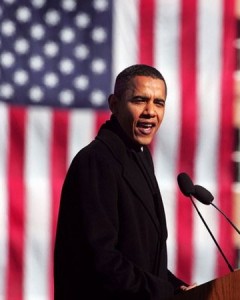Barack Obama may have looked slightly confused today as he fluffed his lines during his swearing in ceremony in Washington DC. But among scientists around the world there seems to be little confusion as to what Obama’s election will mean for science – progress.
 Obama made it clear throughout the election campaign that he’d be taking a different path to President Bush on a number of major science-related issues, particularly embryonic stem cell research and climate change. He reiterated that today briefly in his inauguration speech:
Obama made it clear throughout the election campaign that he’d be taking a different path to President Bush on a number of major science-related issues, particularly embryonic stem cell research and climate change. He reiterated that today briefly in his inauguration speech:
“We will restore science to its rightful place and wield technology’s wonders to raise health care’s quality and lower its cost. We will harness the sun and the winds and the soil to fuel our cars and run our factories. And we will transform our schools and colleges and universities to meet the demands of a new age. All this we can do. And all this we will do.”
More, specifically, the BBC reports some of the changes Obama plans to make:
“I will lift the current administration’s ban on federal funding of research on embryonic stem cell lines created after 9 August 2001,” vowed the president-elect.
This not a complete reversal of the Bush position, as Mr Obama suggests only embryos surplus to in-vitro fertilisation could be used for developing stem cell lines in the future, rather than all or any embryos.
As for space, there will be a centralised body to oversee development of all technology, as there was in the 1960s.
“The National Aeronautics and Space Council oversaw the entire space arena for four presidents; the council was briefly revived from 1989 to 1992,” said Mr Obama.
“I will re-establish this council reporting to the president. It will oversee and co-ordinate civilian, military, commercial, and national security space activities.”
When it comes to climate policy, he recognises that the US needs to be party to international negotiations.
“First, the US must get off the sidelines,” Mr Obama said.
“This is a global problem. US leadership is essential, but solutions will require contributions from all parts of the world.”
This stance was put into practice when he recently announced the appointment of John Holdren as director of the Office of Science and Technology Policy (OSTP).
“Today, more than ever before, science holds the key to our survival as a planet,” the president-elect stated.
Meanwhile, Democrats are already pushing for the money to invest in science and technology – calling for a US$80 billion package to get initiatives such as the digitisation of all health records off the ground.
As Chemistry News points out, Obama even before his inauguration had assembled a dream team of science advisors including a Nobel Prize winner. President Bush in comparison took over a year to appoint his chief science advisor.